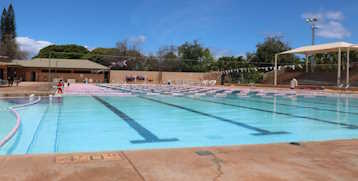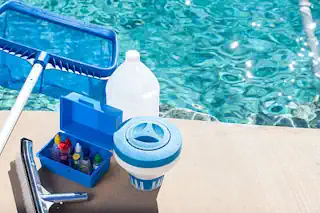The Ultimate Guide to Saltwater Swimming Pools: Beyond the Salty Myths
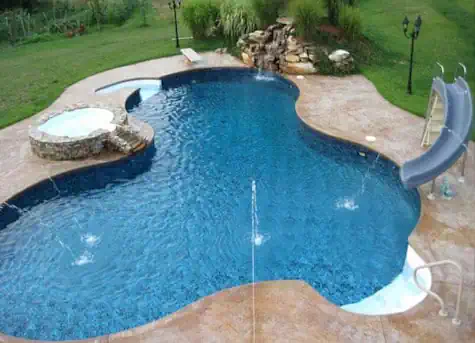
From the shimmering coasts of luxurious resort towns to the backyards of high-end homes, saltwater swimming pools have become the epitome of aquatic indulgence. Despite cries about their environmental impact and high installation costs, saltwater pools are steadily making a splash in the market, enticing pool owners with promises of a more natural, skin-friendly, and potentially cost-effective swimming experience.
In this guide, you’ll drip into the depths of saltwater pool knowledge and emerge with a refined understanding of what’s involved in their implementation, upkeep, and overall ownership. Whether you’re considering a conversion or a new purchase, prepare to wade through the crystalline waters of this increasingly popular pool trend.
Introduction to Saltwater Swimming Pools
Riding the Tide: A Brief History
Saltwater pools aren’t a new concept; in fact, they have a rich history dating back to ancient times. The Romans, for instance, were keen on creating pools that mimicked the salinity of the Mediterranean Sea, believing it added a therapeutic aspect to their bathing rituals. Fast forward to the 20th century, and we saw a resurgence in this type of pool, especially in marine-rich Australia, where the first patented saltwater chlorinator was introduced in the 1970s.
Salinity’s Siren Call: Why Saltwater Pools Are Gaining Popularity
Compared to traditional chlorine pools, saltwater varieties offer several enticing benefits. They are heralded as being gentler on the skin and eyes, with the convenience of not requiring the manual dosing of chlorine. Saltwater pools also have a reputation for smoother, silkier-feeling water, and some claim that reduced exposure to harsh chemicals leads to a better overall swimming experience.
How Saltwater Pools Work
Breaking Down the Salty Science
Despite their aquatic allure, saltwater swimming pools are not as salty as the ocean. The salinity in a saltwater pool is approximately one-tenth that of ocean water, just enough to allow for the electrolysis of salt into the sanitizing agents of sodium hypochlorite and hypochlorous acid. This conversion effectively means that while they are referred to as saltwater pools, they are essentially chlorine-based, albeit produced on-site without the need for periodic chemical additions.
Essential Equipment for Saltwater Pool Conversion
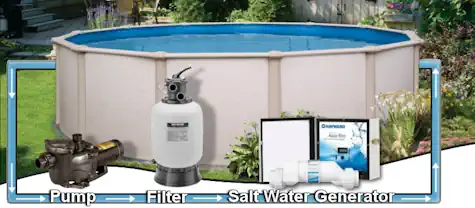
To transform a traditional chlorine pool into a saltwater oasis, certain specialized equipment is needed. Here’s a concise list to guide you:
Salt Chlorine Generator: The heart of a saltwater pool, this device uses electrolysis to convert salt into chlorine, keeping your pool sanitized without the need for adding chlorine manually.
Salt: Specifically made for use in saltwater pools, this type of salt dissolves easily and helps in the chlorination process.
Control Panel: Allows for easy management of the chlorine generator, enabling adjustments to chlorine production based on pool usage and season.
pH Decreaser: Since the process can cause pH levels to rise, having a pH decreaser on hand is necessary for maintaining balanced water chemistry.
Salinity Test Strips or Digital Salinity Reader: Essential for regularly checking the salt concentration in your pool to ensure it falls within the optimal range for your system.
Stabilizer (Cyanuric Acid): Helps in stabilizing chlorine levels, especially important in outdoor pools where UV light can degrade free chlorine rapidly.
Implementing these components will ensure your transition to a saltwater pool is smooth and successful, leading to many enjoyable, low-maintenance swims in your backyard haven.
The Key to Clear Waters: Salt Chlorine Generators Unpacked
At the heart of every saltwater pool lies the salt chlorine generator (SCG), which is tasked with producing chlorine to sanitize the water. These units are comprised of a salt cell and a control panel. The control panel regulates the flow of water and electricity through the cell, where electrolysis occurs. The process disintegrates the salt and releases the chlorine, which then curbs the growth of algae and bacteria.
Installation and Maintenance
Diving Into Conversion: Steps for Transitioning to a Saltwater Pool
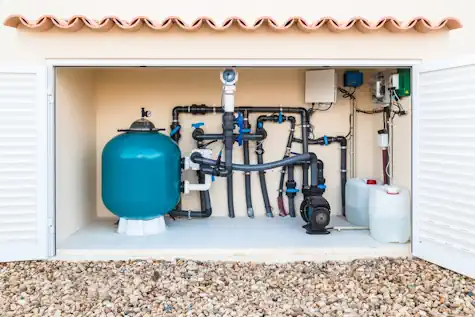
Converting an existing chlorine pool to saltwater involves several important steps:
Testing your water’s chemical levels and balance
Calculating and adding the required amount of salt
Installing the salt chlorine generator
Running the system and adjusting the output levels to maintain adequate chlorination
Keeping the Salty Seas Serene: Maintenance Musts for Saltwater Pools
Regular maintenance is key to enjoying the benefits of a saltwater pool. This includes testing your pool water’s pH, salt levels, stabilizer levels, and calcium hardness. Skimming and brushing should be done as with any pool, and the salt cell should be inspected and cleaned at least once a year. Water hardness can impact the performance of a salt water system so testing, in the beginning, is necessary until the salt systems stabilize.
Cost Comparison
Dollars and Sense: Upfront Costs Vs. Long-Term Savings
It’s commonly touted that saltwater systems are more expensive to install and initially maintain than their traditional counterparts. While it’s true that the initial setup of a saltwater pool can be significantly higher due to the cost of the generator and the potential need for additional equipment, the ongoing costs could be lower. This is mostly due to the reduced need for added chemicals and the longevity of some pool components thanks to less chemical stress.
Dispelling Myths: The True Affordability of Saltwater Pools
Misconceptions about the high cost of chlorine generators or continuous salt purchases can lead many to believe that saltwater pools are a luxury only the well-heeled can afford. However, when looked at over a span of several years, the cumulative costs might not be as steep as initially thought, making them a competitive option for many pool owners.
Health and Environmental Benefits
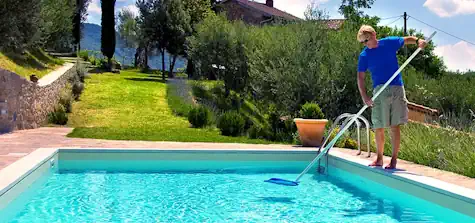
Feeling Good in the Salty Waters: Natural Advantages of Saltwater Pools
Proponents of saltwater pools herald their natural feel compared to chlorinated waters, which can sometimes leave swimmers with dry skin, discolored hair, and red, irritated eyes. They suggest that the continuous production of low levels of chlorine that a salt water pool provides keeps the water balanced and less likely to cause discomfort.
The Green Splash: Eco-Friendliness and Saltwater Pools
Another benefit of saltwater pools is their purported environmental friendliness. Because they don’t require the periodic addition of harsh chemicals, they can have a lower environmental impact. There is also the potential to reduce the amount of chlorine-related chemical waste ending up in our water systems, making saltwater pools a more sustainable choice.
Real-life Experiences
A Day in the Life of a Saltwater Pool Owner
Owners of saltwater swimming pools offer compelling stories of their experiences. They often speak of the initial trepidation and confusion around the setup and maintenance, which gives way to satisfaction with the swim experience, water clarity, and minimal effort required to upkeep their pools once the system is established.
Weathering the Waves: Challenges and Solutions in Saltwater Pool Ownership
Real-life accounts also highlight the challenges that may arise, such as the need for additional monitoring to avert unexpected problems or the misconception that saltwater pools are maintenance-free. These are typically overcome with the right knowledge and a proactive approach to pool care.
Conclusion
Summing Up the Salty Allure
Saltwater swimming pools offer an alluring alternative to traditional chlorine pools, with their promise of a gentler and more natural swimming experience. While they require a different approach to maintenance and may involve a learning curve, they can be an enriching addition to your home’s oasis.
A Call to the Poolside
For pool owners pondering the plunge into saltwater, this guide is intended to steer you through the tides of information, all while illuminating the potential benefits of choosing saltwater over chlorine. Before you decide, ensure you’ve covered all depths—your enjoyment of your pool might just depend on it.
Frequently Asked Questions (FAQ)
How much does it cost to convert a chlorine pool to a saltwater pool?
The cost of converting a chlorine pool to a saltwater system can vary widely depending on the size of the pool and the type of salt chlorine generator selected. On average, you might expect to spend between $1,500 and $2,500 for the complete setup and installation.
Can saltwater pools be heated?
Yes, saltwater pools can be heated just like any other pool. The saltwater is compatible with most types of pool heaters, including solar, gas, and electric. Saltwater pools produce ionized water regularly via the salt chlorinator which can happen before or after the water is heated.
Will a saltwater pool damage my landscaping or pool deck?
Saltwater pools typically do not cause any more damage to landscaping or pool decks than traditional chlorine pools. However, it’s important to manage salt levels properly and ensure that water splashed out of the pool does not consistently soak the same areas.
How often do I need to add salt to my pool water?
You may need to add salt to your pool only a few times a year. This is usually after heavy rainfall, significant splash-out, or when adding fresh water due to evaporation. The frequency will depend on your pool’s usage and weather conditions.
Is managing a saltwater pool easier than traditional chlorine pools?
Many pool owners find managing a saltwater pool to be easier in terms of chemical balancing. This is because the salt chlorine generator produces chlorine steadily, which can help maintain more consistent chlorine levels. However, regular maintenance checks are still necessary.
How long does a salt chlorine generator last?
The lifespan of a salt chlorine generator can vary, but on average, they last between 3 to 7 years. This lifespan can be extended with proper care and regular cleaning of the salt cell.
Are saltwater pools safe for all swimmers?
Saltwater pools are generally safe for swimmers and are often preferred because they tend to be gentler on the skin, eyes, and hair, and are great at killing bacteria. However, individuals with specific health conditions or salt-sensitive skin should consult a healthcare provider.
